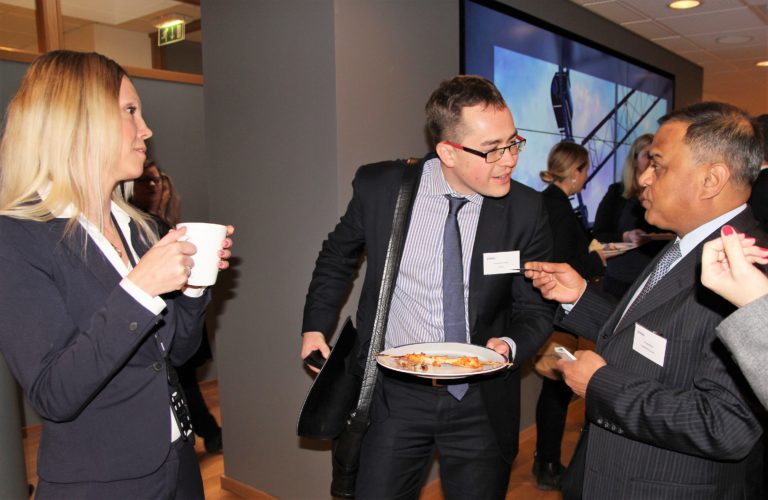
Highlights from NUCC and KMPG's Business Networking Meeting
Doing business in Ukraine and what Norwegian businesses need to know when employing Ukrainian labour was on the agenda at NUCC’s and KPMG Norway’s networking meeting in Oslo February 5th.
The networking meeting took place in KPMG‘s premises in Oslo. You can find the program here and see the video from the meeting here.
Networking meeting was opened with words of greetings by Ambassador of Ukraine to Norway, Mr Viacheslav Yatsiuk.
– I can’t help pointing out that it is quite a powerful signal that KPMG decided to become a cosponsor of this event. KPMG is widely renowned for its strong skills in identifying future successes – so this already gives us good reasons to conclude that the Ukrainian-Norwegian trade and investment cooperation has a very promising future, said the Ambassador.
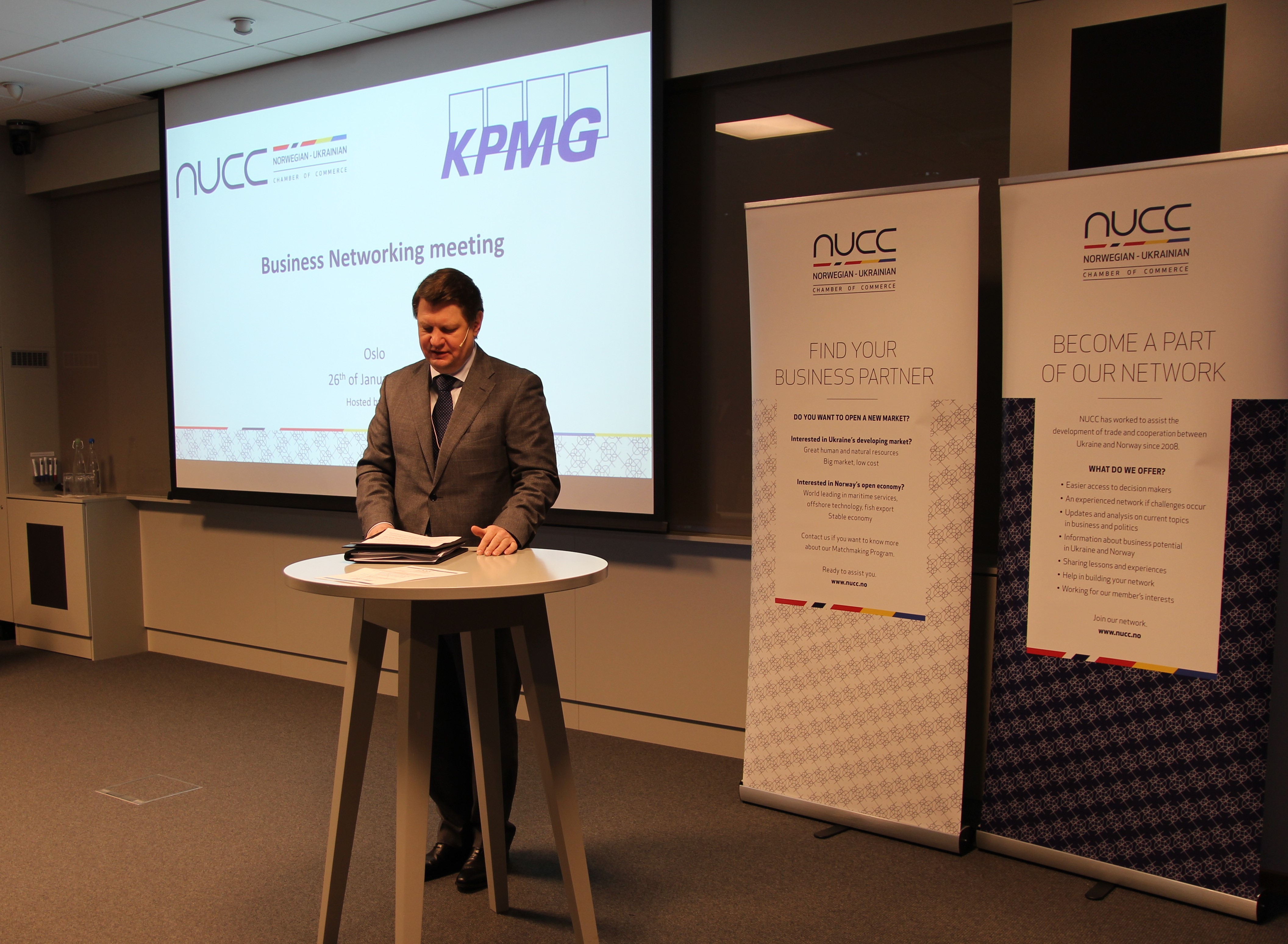
Opening remarks by Mr Viacheslav Yatsiuk, Ambassador of Ukraine to Norway
Although current levels of bilateral trade between Norway and Ukraine are modest, there are according to the Ambassador good reasons to be confident about the future. One of the reason which the Ambassador pointed at, is that our economies are complementary and mutually reinforcing: Norway is an open, modern and well-functioning economy, has advanced technologies, especially in the sphere of renewable energy, is a net importer of agricultural products, and have important financial reserves.
Ukraine’s fast-growing consumer market, comprehensive modernization of many traditional branches of the Ukrainian economy, its Europe’s fastest growing ICT sphere, the importance of its agricultural sector, its highly-educated population, its geographical proximity and low costs of production, engage more and more Norwegian companies to consider Ukraine as a new promising opportunity. You can hear the Ambassadors speech here.
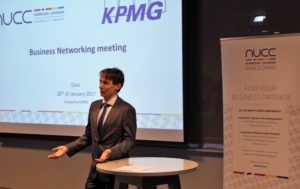
Mr Richard Scarborough shares his experiences as a Counsellor at the Norwegian Embassy in Kyiv.
Former Counsellor at the Norwegian Embassy in Kyiv, Mr Richard Scarborough, pointed out the change in the attitude towards corruption was one of the changes he experienced in the Ukrainian society during his time as Counsellor from 2014 to 2016. Mr Scarborough used the introduction of mandatory declaration of public officials’ property and income as a remarkable example of the ongoing process of increased transparency in Ukraine. He said that he is a big fan of Ukrainian civil society. Civil society in Ukraine has according to Mr Scarborough a remarkable talent pool and shows strong commitment and engagement of young people. You can see Mr Scarborough’s speech here.
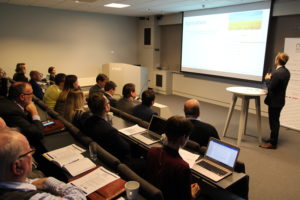
Kjartan Pedersen, managing director at NUCC, presents the opportunities for agricultural trade.
Mr Kjartan Pedersen, managing director, and Ms Linda Skjold Oksnes, project manager in NUCC, gave an update on the development and status of the Norwegian-Ukrainian bilateral trade in goods and services. Mr Pedersen presented numbers on the balance of trade between Norway and Ukraine, based on import numbers from Statistics Norway and State Statistics Service of Ukraine. After a decline from 2012, Mr. Pedersen, showed that the total value of trade in goods rose in 2016.
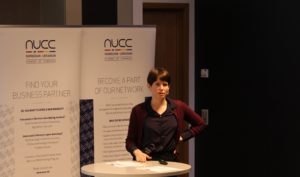
Ms Linda Skjold Oksnes, project manager at NUCC, presents the potential for trade in services.
Services is an important part of the Norwegian-Ukrainian bilateral trade. Services constitute according to Ms Oksnes half of Norway’s main land export. Maritime and offshore services, but also consultancy and ICT are important. In Ukraine ICT is the third largest export sector. Ms. Oksnes referred to numbers from State Statistics Service of Ukraine, which shows that services constituted 60 percent of Ukraine’s export to Norway in 2015.
Seafood is the major export item from Norway to Ukraine, said Roman Pankov, business controller in Pelagia, a leading producer of pelagic fish. Pelagia is according to Mr Pankov one of the main exporters providing 50 percent of the Norwegian fish export to Ukraine. Mr Pankov showed that Norwegian fish export to Ukraine has been falling since 2010, but showed positive growth in 2016. Mr. Pankov expects the market to improve in the future as the Norwegian quota for relevant fish species increase and the Ukrainian market pick up.
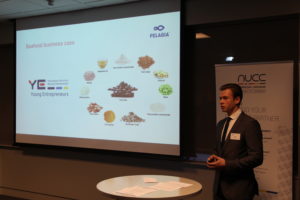
Roman Pankov, business controller in Pelagia, shares a sucessstory form NUCCs Young Entrepreneur program.
Mr Pankov also shared another success story. He was one of 20 talented young Norwegian and Ukrainian entrepreneurs, who took part in NUCCs Young Entrepreneur program. You can read more about this year’s program here.
It was one of the memorable events in 2016, said Mr Pankov. The participants in the program are divided into groups and are together solving real business cases. In that way, they gain first-hand experience with doing business in Norway and Ukraine.
Mr. Pankov’s group was looking at the potential for export of fish feed ingredients from Ukraine to Norway. In their case, it ended in actual business. As marine resources are quite limited, the sector is currently searching for alternative vegetable ingredients. Ukraine is one of the best suppliers of such ingredients in the world, said Mr Pankov. The outcome of the business case is according to Mr Pankov export of 6000 ton of corn gluten from Ukraine to Norway, starting with the first delivery in January. This might seem like a small amount, but it is the way to start, said Mr Pankov. The Norwegian production of salmon is according to Mr Pankov expected to grow from 1 million ton today to 5 million ton in 2050. In here lies very huge potential for export of ingredients to fish feed, said Mr Pankov.
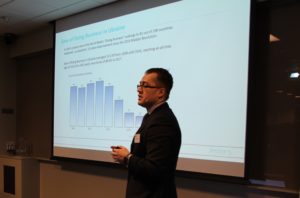
Mr Constantin Solyar, Partner at Asters, speaks about the development in business climate in Ukraine.
A lot has happened in Ukraine since the Maidan revolution in 2014. The government has implemented several reforms to improve business climate and this process is still ongoing. Mr Constantin Solyar, Partner at Asters, one of Ukraine’s leading law firms, presented some of the most important reforms, how it affects businesses and the way it goes forward. Some of the measures, which has improved business climate according to Mr Solyar are: decreased formalities required when starting a business, improved protection of minority shareholders, better contract enforcement, increased transparency, greater protection of private property, unprecedented reboot and re-staffing of the Ukrainian Supreme Court under rigorous control of civil society to bring more justice and fairness. The corporate law in Ukraine is according to Mr Solyar a bit outdated and the modernization is underway. The civil society, think tanks and many lawyers are working to bring progressive corporate regulations. The overall idea in Ukraine right now is bringing transparency into many spheres of regulation and control. It is difficult to do corruption when there are transparent processes, said Mr Solyar. The best example is according to Mr. Solyar the electronic procurement system, ProZorro.
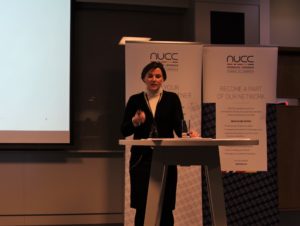
Ms Gjertrud Hauan Behringer, Partner at KPMG, speaks about regulations relevant when employing Ukrainian labour.
Three experts on tax and regulations for hiring foreign labour from KPMG Norway, Ms Gjertrud Hauan Behringer, Partner, Mr Håkon Rakkenes, Attorney-at-law, and Unn Kristin Mardal, head of Immigration practice, talked about what should Norwegian enterprises should be aware of when engaging Ukrainian labour force.
According Ms Behringer whether your company is subcontracting or hiring labour is important for the parties’ obligations. Generally, employment is regulated by Ukrainian rules for Ukrainian labour temporary in Norway, but there are, as Ms. Behringer explains, some exceptions: working hours, minimum wage and coverage of expenses, and health, safety and environment rules.
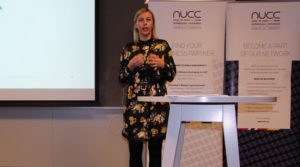
Unn Kristin Mardal, head of Immigration practice in KPMG, explains visa and work permit rules for nationals from third countries, such as Ukraine.
Whether business visa is enough does not, according to Ms Mardal, depend on the duration of the persons stay in Norway, but what the person are doing. If people from third country national are going to do any hands-on work, they need to have work permit. Ms Mardal said that there are some exceptions where the resident permit requirement does not apply for short-term work. This is for example commercial and business travellers, in-house training in international companies, and persons with technical qualifications.
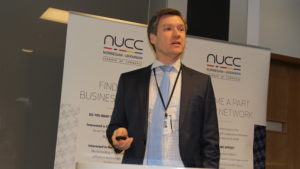
Mr Håkon Rakkenes, attorney-at-law in KPMG, explains tax regulations and reporting obligations when employing Ukrainian labour.
Mr Rakkenes explained the tax regulations and reporting obligations for companies engaging foreign labour. When employing people from a temporary work agency, both the company hiring out and the company hiring are responsible for reporting to the tax authorities. Assignments worth less than 10 000 are not covered, said Mr Rakkenes.
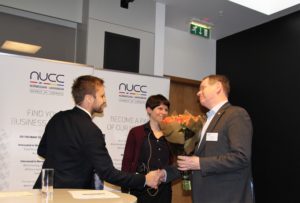
Former managing director, Mr Amund Myklebus is receiving flowers from the current managing director Mr Kjartan Pedersen and Ms Linda Oksnes.
At the end of the networking meeting the NUCC team handed over flowers to the former managing director, Mr Amund Myklbust. We are very grateful for his efforts and enthusiasm for NUCC and for Ukraine.
After the presentations it was time for networking. Below you will find some pictures.
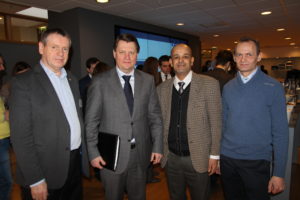 Mr Viacheslav Yatsiuk, Ambassador of Ukraine to Norway and Mr Amund Myklebust, former managing director of NUCC, with participants at the networking meeting. Mr Viacheslav Yatsiuk, Ambassador of Ukraine to Norway and Mr Amund Myklebust, former managing director of NUCC, with participants at the networking meeting. |
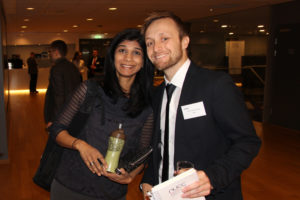 Ms Laxmi Akkaraju, chair of NUCC, and Mr Kjartan Pedersen, managing director of NUCC Ms Laxmi Akkaraju, chair of NUCC, and Mr Kjartan Pedersen, managing director of NUCC |
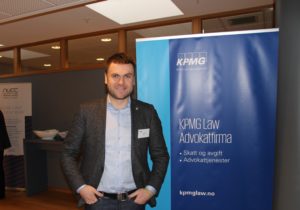 Dmitry Primak, advisor at NUCC Dmitry Primak, advisor at NUCC |
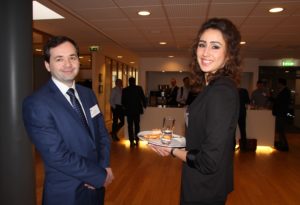 Mr Oleh Hrabovetskyi, First Secretary at the Ukrainian Embassy in Norway, and Ms Veronika Vakulenko Mr Oleh Hrabovetskyi, First Secretary at the Ukrainian Embassy in Norway, and Ms Veronika Vakulenko |
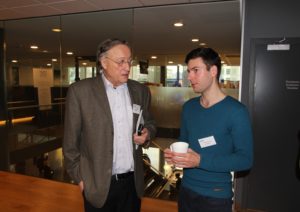 |
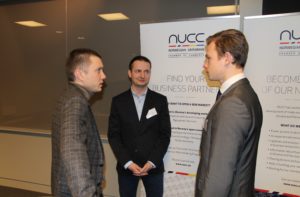 |




